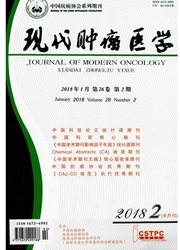

 中文摘要:
中文摘要:
目的:通过检测血管内皮生长因子受体(Flt-1)以及多药耐药(MDR)基因产物在非小细胞肺癌中的表达,探讨非小细胞肺癌多药耐药机制与肿瘤血管生成的相关性及临床意义。方法:应用免疫组化技术SP法,对56例肺癌标本和20例癌旁组织进行上述2种指标检测并分析。结果:在非小细胞肺癌组织中Flt-1和GST-π表达阳性率分别为76.8%、81.3%,Flt-1的表达与临床分期,淋巴结转移以及组织分化程度有关(P〈0.05),但与组织类型无关;GST-π的过表达与肿瘤细胞组织学类型和细胞分化程度有关,腺癌和低分化癌组织中GST-π表达的阳性率明显降低(P〈0.05)。结论:Flt-1和GST-π在未行放化疗的肺癌组织中均有不同程度的高表达,且与肺癌某些生物学行为有关,联合检测有助于化疗药物选择及预后判断。
 英文摘要:
英文摘要:
Objective: To investigate the expression of Flt - 1, GST - π in non - small cell lung cancer and evaluate its clinical significance, nethods:A total of 56 cases with lung cancer were examined by immunohistochemical SP method. Results :The positives rates of Flt - 1, GST - π in lung cancer tissue were 76.8% and 81.3% respectively. The expression of Flt - 1 was related to clinical stage, lymph node metastasis and classification of histodifferentiation ( P 〈 0.05 ), but not related to pathological type; The overexpression of GST - π was correlated to histological grade and histological type, there was significant low expression in the squamous carcinoma and the low - differentiated carcinoma. Conclusion: F;t - 1, GST - π were over expressed in various degree of non - small cell lung carcinoma without chemotherapy, and related to some biology behavior of the cancer. Combined detection is of much benefit to the choice of the drug of chemotherapy and the prediction of prognosis.
 同期刊论文项目
同期刊论文项目
 同项目期刊论文
同项目期刊论文
 期刊信息
期刊信息
